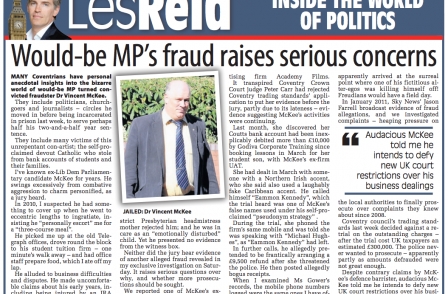
There's been a fascinating personnel development in a mini newspaper war raging away in the West Midlands.
The multiple award-winning journalist Les Reid, who controversially left Trinity Mirror’s Coventry Telegraph last month, is now working for the competing Coventry Observer, owned by the independent Bullivant Media group.
Nearly a year ago I described Reid, then the Telegraph’s political reporter, as “unsackable” in my list of ‘Regional heroes of 2013’, noting how he’d bounced back from threatened redundancy by arguing for and keeping his job, and then won a hat-trick of awards.
What I didn’t know back then was that Reid was soon suspended by the Telegraph, a fact that came out when he resigned this October after nine months of confused delays.
I say "confused" after speaking to senior figures and sources on both sides of this dispute and finding out that while there are normally two sides to every story this saga has at least five.
Reid himself is angry that he was suspended for what he felt was simply doing his job – relentlessly challenging Coventry City Council for what he claims is its ongoing secretive role in the controversial Ricoh Arena dispute.
Commenting via his @lesreidpolitics Twitter account, Reid cited his case as an example of the “decline of public interest journalism”, announcing he would sue his employers at industrial tribunal and would include his experiences in a book.
From what I’m told, his case has been strengthened by the “prejudiced” content of emails sent by various Trinity Mirror bosses about his case, which the company was forced to disclose to Reid via subject access requests made by him under the Data Protection Act.
On the other hand, according to my sources, Alun Thorne, the then editor at the Telegraph, felt that Reid was correctly suspended for being “too obstinate and arguably insubordinate” in how he went about his Ricoh investigations.
But once suspended, I understand Reid launched a formal grievance alleging “bullying”, leaving one senior Canary Wharf boss so exasperated at the delays and counter-claims that I’m told he said – and I paraphrase – “just get it sorted, whatever the cost”.
The row has even split colleagues: Reid is being represented in his dispute by Chris Morley, the full-time regional organiser of the NUJ, while members of the Telegraph’s own NUJ chapel have been fully supportive of ex-editor Thorne, even issuing a public statement to that effect.
Perhaps coincidentally, Thorne also resigned his editor’s chair last month, within days of Reid’s departure, moving to a new job as a senior spin-doctor at Barques, a Birmingham-based PR agency.
Now I know both Thorne and Reid and, while they are very different people, they each to my mind care very much about what they do.
I’ve regularly read Reid’s work, and can see how he might have come across as too much of a dog-with-a-bone about Ricoh to the point of unhealthy obsession – although I’m sure he’d say this is how any committed investigative journalist should be.
Meanwhile, some argue that when Thorne was the Telegraph’s editor the paper became too cosy with Coventry City Council bosses who were opposed to Reid’s investigative line – although others believe Thorne’s stance with the council and Reid was absolutely correct.
Regardless of the rights or wrongs, the quarrel has been damaging to the Telegraph, which currently has no editor, a demoralised staff, and the prospect of its washing being laundered in public at industrial tribunal – with Reid said to be uninterested in any pay-off to buy his silence.
Whoever’s eventually sent to Coventry as the new Telegraph editor, will still have to contend with an unwavering Reid continuing his scrutiny of local politics and public affairs for the Coventry Observer, which has been biting at the heels of the Telegraph since it was launched in 2002.
Reid’s first splash for his new paper on 30 October was headlined: "Sky Blues set to bid for Ricoh", reminding his former title that he’s still very much following the Coventry stadium dispute, which is becoming even more entangled than his own quarrels.
One thing’s for sure: if this case ever gets to industrial tribunal, it’s going to get very messy.
Steve Dyson, a former editor of the Birmingham Mail and Teesside Evening Gazette, commentates on the regional media for various publications, websites and BBC radio, and offers training via www.dysonmedia.co.uk.
Email pged@pressgazette.co.uk to point out mistakes, provide story tips or send in a letter for publication on our "Letters Page" blog
